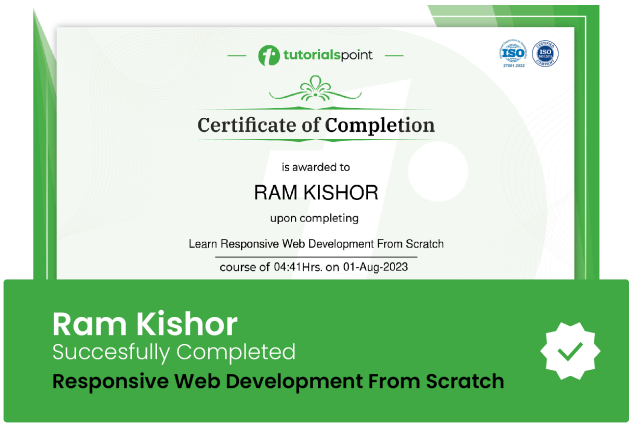understood
Oracle PL/SQL Training Course
Learn PL/SQL architecture, programming, and fine-tuning in depth from basics to advanced level.

Lectures -19
Duration -4.5 hours

30-days Money-Back Guarantee
Get your team access to 10000+ top Tutorials Point courses anytime, anywhere.
Course Description
Oracle PL/SQL Training Course is a comprehensive guide designed for learners who want to learn how to develop PL/SQL programs and Become Oracle Developer/DBA. It is suitable for beginners as well as experienced developers.
Oracle PL/SQL Training Course Overview
Become a PL/SQL expert with this comprehensive Oracle PL/SQL training course. It will teach you all the essential concepts and skills from basic to advanced topics. Develop and deploy scalable and performant database applications using PL/SQL.
You will learn about PL/SQL architecture, data types, variables, control structures, procedures, functions, packages, dynamic SQL, and more. Oracle PL/SQL is a powerful programming language that allows you to extend the capabilities of your Oracle database. With PL/SQL, you can write complex business logic, automate tasks, and improve the performance of your database applications.
Goals
What will you learn in this course:
- Develop PL/SQL programs from scratch to advanced topics.
- Write PL/SQL procedures, functions, and packages.
- Use dynamic SQL in PL/SQL.
- Understand PL/SQL architecture and building blocks.
- Develop data types, variables, and control structures in PL/SQL.
- Manage PL/SQL code and dependencies.
- Implement common database security features in PL/SQL.
- Troubleshoot and debug database applications using PL/SQL.
- Increase your job prospects and earning potential by becoming a PL/SQL developer.
Prerequisites
What are the prerequisites for this course?
- Basic knowledge of SQL is required.

Curriculum
Check out the detailed breakdown of what’s inside the course
Overview of PL/SQL
1 Lectures
-
Overview of PL/SQL 06:47 06:47
Declaring PL/SQL Variables
1 Lectures

Writing Executable Statements
1 Lectures

Interacting with Oracle DB Server
1 Lectures

Writing Control Structure
1 Lectures

Working with Composite Data Types
1 Lectures

Using Explicit Cursors
1 Lectures

Handling Exceptions
1 Lectures

Creating Procedure
1 Lectures

Creating Functions
1 Lectures

Creating Packages
1 Lectures

Working with Packages
1 Lectures

Using oracle-supplied Packages in Application Development
1 Lectures

Using Dynamic SQL
1 Lectures

Design Consideration for PL/SQL Code
1 Lectures

Creating Triggers and Creating Compound, DDL, Event Database Triggers
1 Lectures

Using the PL/SQL Compiler
1 Lectures

Managing PL/SQL Code
1 Lectures

Managing Dependencies
1 Lectures

Instructor Details

Uplatz
Uplatz is UK-based leading IT Training provider serving students across the globe. Our uniqueness comes from the fact that we provide online training courses at a fraction of the average cost of these courses in the market.
Over a short span of 3 years, Uplatz has grown massively to become a truly global IT training provider with a wide range of career-oriented courses on cutting-edge technologies and software programming.
Course Certificate
Use your certificate to make a career change or to advance in your current career.

Our students work
with the Best


































Feedbacks
Tres bon cours avec des exemples concrets
Related Video Courses
View MoreAnnual Membership
Become a valued member of Tutorials Point and enjoy unlimited access to our vast library of top-rated Video Courses
Subscribe now
Online Certifications
Master prominent technologies at full length and become a valued certified professional.
Explore Now


 Updated on Apr, 2024
Updated on Apr, 2024
 Language - English
Language - English